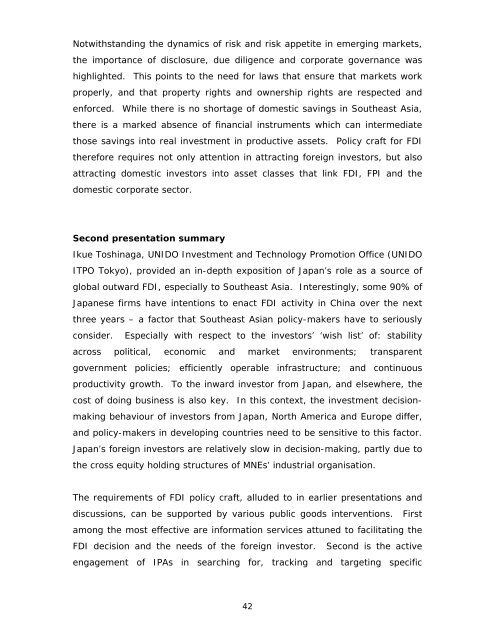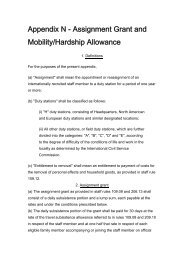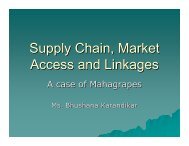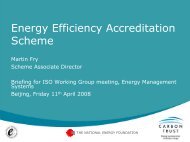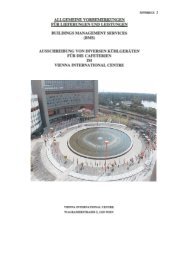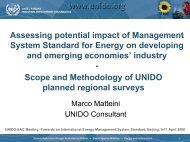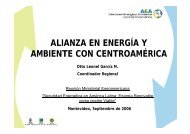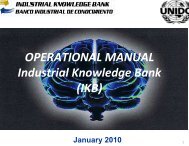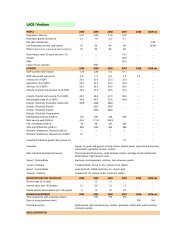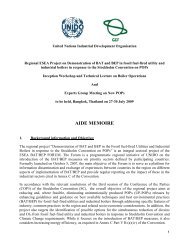Foreign direct investment in Southeast Asia: - Regional Office China
Foreign direct investment in Southeast Asia: - Regional Office China
Foreign direct investment in Southeast Asia: - Regional Office China
Create successful ePaper yourself
Turn your PDF publications into a flip-book with our unique Google optimized e-Paper software.
Notwithstand<strong>in</strong>g the dynamics of risk and risk appetite <strong>in</strong> emerg<strong>in</strong>g markets,the importance of disclosure, due diligence and corporate governance washighlighted. This po<strong>in</strong>ts to the need for laws that ensure that markets workproperly, and that property rights and ownership rights are respected andenforced. While there is no shortage of domestic sav<strong>in</strong>gs <strong>in</strong> <strong>Southeast</strong> <strong>Asia</strong>,there is a marked absence of f<strong>in</strong>ancial <strong>in</strong>struments which can <strong>in</strong>termediatethose sav<strong>in</strong>gs <strong>in</strong>to real <strong><strong>in</strong>vestment</strong> <strong>in</strong> productive assets. Policy craft for FDItherefore requires not only attention <strong>in</strong> attract<strong>in</strong>g foreign <strong>in</strong>vestors, but alsoattract<strong>in</strong>g domestic <strong>in</strong>vestors <strong>in</strong>to asset classes that l<strong>in</strong>k FDI, FPI and thedomestic corporate sector.Second presentation summaryIkue Tosh<strong>in</strong>aga, UNIDO Investment and Technology Promotion <strong>Office</strong> (UNIDOITPO Tokyo), provided an <strong>in</strong>-depth exposition of Japan’s role as a source ofglobal outward FDI, especially to <strong>Southeast</strong> <strong>Asia</strong>. Interest<strong>in</strong>gly, some 90% ofJapanese firms have <strong>in</strong>tentions to enact FDI activity <strong>in</strong> Ch<strong>in</strong>a over the nextthree years – a factor that <strong>Southeast</strong> <strong>Asia</strong>n policy-makers have to seriouslyconsider. Especially with respect to the <strong>in</strong>vestors’ ‘wish list’ of: stabilityacross political, economic and market environments; transparentgovernment policies; efficiently operable <strong>in</strong>frastructure; and cont<strong>in</strong>uousproductivity growth. To the <strong>in</strong>ward <strong>in</strong>vestor from Japan, and elsewhere, thecost of do<strong>in</strong>g bus<strong>in</strong>ess is also key. In this context, the <strong><strong>in</strong>vestment</strong> decisionmak<strong>in</strong>gbehaviour of <strong>in</strong>vestors from Japan, North America and Europe differ,and policy-makers <strong>in</strong> develop<strong>in</strong>g countries need to be sensitive to this factor.Japan’s foreign <strong>in</strong>vestors are relatively slow <strong>in</strong> decision-mak<strong>in</strong>g, partly due tothe cross equity hold<strong>in</strong>g structures of MNEs’ <strong>in</strong>dustrial organisation.The requirements of FDI policy craft, alluded to <strong>in</strong> earlier presentations anddiscussions, can be supported by various public goods <strong>in</strong>terventions. Firstamong the most effective are <strong>in</strong>formation services attuned to facilitat<strong>in</strong>g theFDI decision and the needs of the foreign <strong>in</strong>vestor. Second is the activeengagement of IPAs <strong>in</strong> search<strong>in</strong>g for, track<strong>in</strong>g and target<strong>in</strong>g specific42


